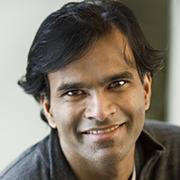
Taming the ticking mind: Economist outlines work on managing tasks and time, in the Harvard Gazette." src="/profiles/openscholar/modules/contrib/wysiwyg/plugins/break/images/spacer.gif" title="<--break-->">
By Maureen Brown, Harvard Correspondent
“When a man knows he is to be hanged in a fortnight,” said Samuel Johnson, “it concentrates his mind wonderfully.” Most of us, spared such an imperative, carry on in a less-concentrated state, but it holds that of limited time, energy, and money, time is the one of which no one can muster more. Add in, as the year draws to a close, exams, papers, holiday shopping, and travel, and the demands on us multiply. If things get tight enough, an already unquiet mind suffers.
Sendhil Mullainathan, a professor of economics at Harvard, is co-author, with Eldar Shafir, of “Scarcity: The New Science of Having Less and How It Defines Our Lives,” published last year. Mullainathan says the study of scarcity “is based on the notion that you have all these unconscious processes for capturing your attention” — machinery, in a sense, that lies just below the surface (and which, incidentally, the practice of mindfulness can help us see and “get above”).
Speaking in his office at the Littauer Center, Mullainathan, a 2002 MacArthur Fellow, described the curious equation that exists between scarcity and its opposite number, abundance, and how each can skew behavior. Scarcity brings focus, which Johnson knew; not only are we better able to accomplish things (or perhaps submit equably to the gallows), but we sometimes can do so with a fillip of unexpected creativity. Read more